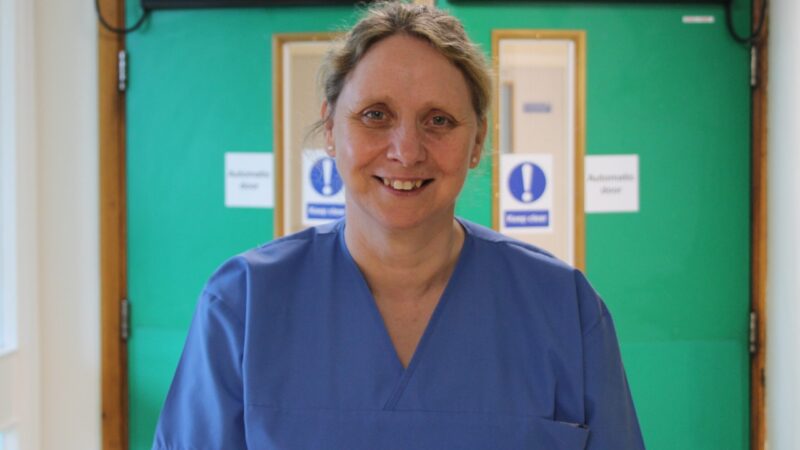
A newly qualified nurse is opening up about the strengths and challenges her autism brings to working in a healthcare environment.
Lin Fidgin, 54 from Stockton, qualified as a registered nurse in September last year.
Having spent most of her life working in graphic design and press photography, she left work to care for her mum, a former nurse herself, after she was diagnosed with breast cancer. Here, she found a passion for care and decided to make a career change to become a nurse.
Since qualifying, Lin has worked on the surgical decisions unit at the University Hospital of North Tees – an area of healthcare she believes her autism is particularly suited to. She is now taking up a Masters’ degree to further her nursing education, with the end goal of becoming a clinical research nurse.
As part of Autism Acceptance Month this April, Lin has written a blog about how autism impacts her new role…
Lin Fidgin: Navigating my newly qualified nursing role as an autistic woman
Stepping into the realm of registered nursing, freshly armed with my adult nursing qualification has no doubt been exciting. The transition from student to professional life is daunting for most but, as an autistic woman, this journey is compounded by layers of complexity that are invisible to most looking on.
The essence of nursing is deeply rooted in human connection, requiring a blend of empathy, communication, and unwavering dedication. Whilst I feel these are qualities I possess, they come at a significant personal cost due to my autism.
The persistent demand for social interaction, a cornerstone of the healthcare environment, depletes my energy reserves, leaving me at times fighting a sense of overwhelm, not experienced since my secondary school days.
The irony of my situation is palpable, I clearly exhibit no outward signs of distress and am assured of my professional competence, and I have only ever been included and made to feel genuinely welcome by my work team on the surgical decisions unit. However, as an autistic woman at times I have found myself feeling very much as I did when I retreated from school as a way of dealing with the social struggles of that environment.
Yet, the stakes are higher now. The luxury of withdrawal is no longer an option, or one I want to take. I have worked too hard to get where I am and despite my ‘differences’ I love nursing. The responsibilities that adulthood brings, a career I am passionate about, and my ongoing academic pursuits keep me from leaving even when I feel like escaping.
Silent battles, boundaries and passion
My constant internal struggles are at odds with my external achievement and paint a vivid picture of the silent battles fought by autistic individuals, particularly women, who often mask their challenges to conform to societal norms. This mask, while protective, can take a heavy toll on mental and physical health. Therefore, as an autistic professional it is imperative to find a balance between professional duties and personal wellbeing.
The pursuit of a master’s degree has no doubt added another layer of complexity to my life-work balance but is something I very much enjoy, representing my passion for lifelong learning and my dedication to the field of public health and nursing. It is a comforting reminder of why I embarked on my nursing journey. The challenge, however, lies in managing my academic responsibilities alongside my job as a newly qualified nurse, without compromising my health or professional integrity.
I am learning the importance of setting boundaries, advocating for my needs, and seeking support when necessary. These are not concessions but vital strategies for preserving health and ensuring my ability to contribute meaningfully to my job role and profession. For me, the decision to extend my master’s degree by one year has helped to bring balance.
The unique challenges that come with being an autistic woman may make social interaction difficult for me but also contribute to my strengths as a nurse and a student; my attention to detail, my ability to focus intensely on complex tasks, and my empathetic connection to patients who themselves might feel isolated by their experiences.
Feeling too much
I think it’s a misconception that autistic people aren’t empathetic. If anything, we feel too much. We’re overly empathetic, we take it home, we worry – and I think that’s a strength in this role.
I genuinely believe that within my role as a nurse, my openness about being autistic brings a strength in vulnerability and a power in authenticity.
In sharing my experience as an autistic newly qualified nurse, I hope to shed light on the nuanced challenges faced by autistic individuals in the workforce, particularly in roles that demand high levels of social interaction. There is a real need not to just accept us but to have a greater understanding, to support, and give reasonable accommodation to ensure that diversity in the workplace encompasses not only visible differences but also the invisible ones.
Support
Support with autism is available from: